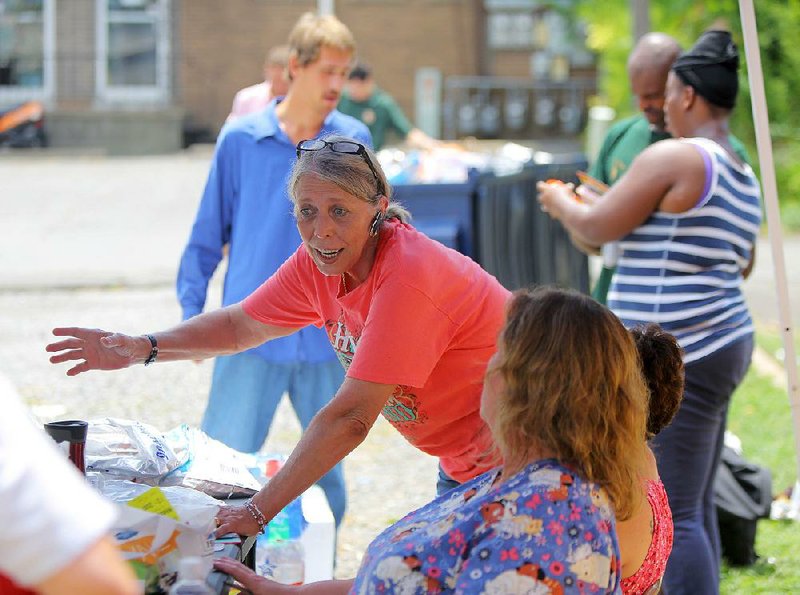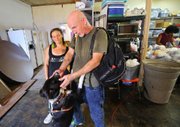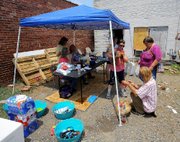While volunteering with her church, feeding Little Rock's homeless, Rhonda Martinez noticed a recurring pattern. The people with dogs kept giving their food to their pets. One Thursday in April, she watched a man open a container of food, then start eating out of one side, while his dog ate out of the other.
Something in her snapped.
"You sit there and you watch it, and these people, they don't have anything, but they will give everything they do have to their dogs," she says. "They'll stop you and not ask you for food for them, they'll ask you for food for their dog. Well, somebody needs to be paying attention to that."
That's when Martinez, 60, a nurse of 34 years in the Central Arkansas Veterans Healthcare System, decided that she was that someone.
She reached out to her veterinarian, Dr. Richard Allen of North Little Rock, as well as a nearby pet-grooming service, for donations of dog food. Out of her own pocket, she bought 20 reusable bags and filled them with treats, Neosporin, antiseptic wipes, toys, flea protection medicine, a blanket and more food. And on May 12, the next time her church -- Lakewood United Methodist in North Little Rock -- took part in the Broadway Bridge Project's feed the homeless effort, she gave it all away. The Project is made up of a group of churches that work to feed Little Rock's homeless.
It was the beginning of a new ministry, devoted exclusively to the pets of the homeless.
"All of these people are living on the fringes of society," Martinez says. "They are marginal. They are displaced in society. And if you have an animal tied to you, most places close their doors to you."
MEMORIES OF CHILDHOOD
For Martinez, who grew up on a farm in rural Fulton County near the Missouri line, the homeless' love of their dogs evoked memories of her childhood. A born animal lover, she regarded the cattle and pigs as her pets. She tried to hide them.
"Anything I could do to prevent them from being butchered," she says.
In her adult life, Martinez has continued to care for animals. She owns four dogs, about her average, and has taken in as many as 17 at one time.
The pet ministry was a natural progression. On June 9, she again distributed dog food and supplies out of her car while the Broadway Bridge Project fed the homeless. Then she started taking the supplies several times per week to the street in front of From His Throne Ministries, a church that provides food and other services for the homeless. For most of the last 20 years, the church's services were held under the Broadway Bridge. Renovation on the bridge prompted a move, and in October, the church moved to an old garage at the corner of West Markham and South Ringo streets.
Its pastor, Joe Malat, 46, says he is ordained through the Agape School of World Evangelism. He began to notice Martinez's efforts to help the pets.
"I heard a lot of the guys talking about the dog lady, the dog lady," Malat says. "She asked if I minded her giving [out] stuff outside. I said, 'Yeah, if you want, but you can come inside if you want.' And that's how it kind of all started."
Using the church as a base allowed food to be distributed to the dogs consistently throughout the week, Martinez says. It also provided a place for the homeless to take their dogs, as well as a way to contact her.
'REAL PET-FRIENDLY'
While Malat's family has five dogs and he describes himself as "real pet-friendly," that played little role in the decision, he says.
"Our congregation ... they depend on pets and unlike, say, the normal churchgoers, who can leave pets [at home], they don't have that option," Malat says. "As a trial basis, I said, 'Let's see how this goes.' Originally, it was you can bring them without a leash. Now you have to bring it with a leash, sometimes you can put them in a kennel. They've got to be on a leash while you're in the church so it can't go running off."
The church is open from 1 to 7:30 p.m. Monday, Tuesday, Thursday and Friday with nightly dinners, and 10 a.m. to 2 p.m. on Sunday, when there is a regular church service and lunch. Martinez says the dogs stay mostly quiet during services.
On June 26, Martinez received a call asking for help. There had been an accident. When she arrived downtown, she found a puppy with a broken jaw and a worried owner. She called Allen, who performed surgery pro bono.
To keep the puppy out of the heat and prevent it from using its mouth during the healing process, Martinez paid for its owners, Shauna Walker and her fiance, William Kelley, to stay with it in a hotel for two weeks.
Like most congregants at From His Throne Ministries, Walker and Kelley lived outside.
A VERY PRACTICAL NEED
The acts of generosity returned to them more than just a healthy pet, whose care they could not have otherwise afforded. For Walker and Kelley, their dog, a pit bull mix named Twizted, fills a very practical need.
"Kind of like your dogs at home, you know, they're not going to let some stranger come up in your house," she says. "[And] for a lot of us, [having a dog] gives us hope again. That companionship. Instead of feeling worthless."
There was another, more profound benefit. After two weeks at the hotel, Walker and Kelley became so well-liked by the staff that they were offered jobs, Martinez says: Kelley working maintenance, Walker helping with maid service.
The couple have started their new jobs at the hotel -- and moved into an efficiency apartment on the premises.
Word of the help Martinez had provided to Walker and Kelley and others began to spread.
Lori Sattler, a medical assistant at Arkansas Specialty Orthopedics, volunteers at local animal shelters. Unknown to Martinez, Sattler had also been helping the homeless' pets with food and shots after seeing the need while volunteering through her church, First Assembly of God in North Little Rock. When Sattler heard about Martinez's operation at From His Throne Ministries, she met with Martinez and the women decided to work together.
"That's when the volunteers started showing up, medications started being provided," Martinez says.
Research led Sattler to Pets of the Homeless, a Nevada-based nonprofit organization that distributes pet food and supplies and arranges veterinary care across the country. When she got her personal veterinarian, Kim Miller of Chenal Valley Animal Hospital, to start providing services to the homeless, Pets of the Homeless reimbursed the cost.
Other food and supplies have been donated by individual people, as well as Hollywood Feed, a pet supply store, and Arkansans for Animals, a nonprofit organization that provides low-cost or complimentary vaccinations, spay/neuter and basic veterinary care.
Martinez welcomes donations, as well as help. A couple of the biggest things homeless owners need right now, she says, are car rides to take their dogs to the spay or neuter surgery, and also a cool place for the dog to stay for a night or two while it recovers. Female dogs especially must take time to recover from spay surgeries so that there are no infections.
COUNTING HOMELESS DIFFICULT
Accurately counting the homeless is notoriously difficult. Volunteers counted 830 homeless people during a 2015 tally of shelters in Pulaski, Saline, Lonoke and Prairie counties, according to figures released in September by the Central Arkansas Team Care for the Homeless.
It is unclear how many of those people own pets. Pets of the Homeless estimates that 5 percent to 10 percent of homeless people nationwide own dogs, cats or both.
While owning a pet provides many psychological and practical benefits to those living without a home, it can also create obstacles. Going from living on the streets to permanent housing usually requires an intermediate stay in a homeless shelter, a transitional housing facility or a motel. Most shelters will not allow pets that are not service animals, according to Pets of the Homeless, while health department restrictions and the safety of other tenants often precludes other places from allowing pets.
Rather than face the prospect of separating from or giving up their dogs, some homeless pet owners simply avoid shelters.
On the subject of homeless ownership of pets, some animal welfare groups agree that the homeless shouldn't be separated from their pets.
Robert Hensley, legal advocacy senior counsel for the American Society for the Prevention of Cruelty to Animals, says the "evolving" point of view is that the most important goal is to keep pets with their owners. That includes the homeless.
'WHAT WOULD HAPPEN'
"You have to think about what would happen to these animals otherwise," Hensley says. "If they're with them, they're not in a[n] [animal] shelter. If they're with a homeless person, it can be a good life for a dog, particularly if they can access vet care and food and things like that."
In her brief experience working with the homeless, Sattler is convinced as well.
"What I used to think is that you had to have money to own pets completely, or to provide good care," she says. "And that's completely not true. They love their animals as much as anyone else, if not more. They just don't have the funds to be able to keep them healthy. And to keep the animals out of the shelters and to keep them with their people is the main thing."
Sattler also thinks there are benefits to ownership by the homeless.
"I've discovered that animals with homeless people don't have a lot of the anxieties. They're around their owners. They're not stuck [isolated] at home."
Savana Vinson, 24, has brown hair and freckles. She wears a T-shirt, and looks like she could be a counselor at a summer camp. But she says she suffers from depression, borderline personality disorder and post-traumatic stress disorder. She traces the PTSD back to Thanksgiving morning 14 years ago, when she found her mother, who had died in her sleep. She says she has bad dreams about it. She has been homeless off and on for two years.
In early July, a friend surprised her with a Labrador-Great Dane puppy as an early birthday present. She named him Mr. Pickles.
"He's my first dog since being homeless, but not my first dog," she says.
A week later, she and her boyfriend, William, 27, who would not give his last name, returned from a Sunday service at From His Throne Ministries to find their campsite destroyed by a fire. Lost in the fire were Vinson's medication and the last picture she had of her, her mother and her brother together.
"It's been hard, but he has helped me through it," she says of Mr. Pickles. "He's pretty much like my baby. He wakes me up in the morning and he loves on me whenever me and Will are arguing or whatever. I can go outside and he's there loving on me."
Most homeless people treat pets like their children, William says. They provide motivation.
"When you're single, living by yourself, you sleep till noon," he says. "Just go camping for a week in the city, leave everything you own and see if you aren't depressed as hell. Now do it with a dog."
Vinson is aware that people may be skeptical of homeless people owning pets.
"A lot of people ask, 'How can you be homeless and expect to take care of an animal?" she says.
William nods.
"Mr. Pickles gives us a reason to get out of the tent," he says. "Yeah, we take care of ourselves, but it gives you something to be responsible for."
Martinez says the Lakewood United Methodist Church is in the process of adding more information about the pet ministry on its website, expandingthelight.org. One may also find information at facebook.com/lakewoodumc.
Style on 08/14/2016




